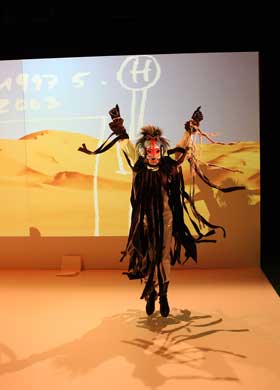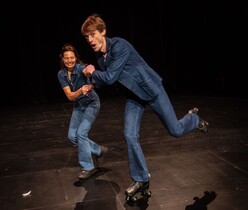Young Europe Blog: 15.15 – Sascha Bunge stages Berlinki's Experimental Set-Up
Black hole swallows universe
by Alissa Rubinstein
Berlin, May 14th 2013. We've all been there before. You're in a hurry, you need to get to wherever it is you need to get to RIGHTNOW, you sprint to your regular bus stop to catch your regular bus at its regular time, and...it doesn't come. It's not here. It's still not here. OH my gosh.
You wait. You wait a little longer. Should you walk? Should you keep waiting? But wait...
What does it mean to wait, anyway? What are you actually waiting for?
The German version of "15:15" opened the Young Europe Festival last night (after a slight wait, of course – the festival patron's plane was delayed – more waiting!) The title, "15:15," refers to the time the bus is supposed to come.
SPOILER ALERT: the bus never comes. Instead, a black hole swallows the universe, a giant monkey eats a banana, a young statistician misses his date and waxes poetic about love and first impressions, old lady chatters on about the good old days and the Judge of the Supreme Court of the Universe lays down the law.
Sound confusing? It is.
Immeasurable world
The play deals with chaos theory and humans' attempts to measure a world that by definition is immeasurable, to wrestle chaos into a structure that makes sense. An everyday is the foundation for a fantastical flight into a magical, philosophical, mathematical world, where nothing makes any sense but love reigns supreme. Or maybe not? I'm still not sure.
According to a post-show discussion at which both the German and Finnish dramaturges, Julia Schreiner and Emma Puikkonen, were present, along with all eight members of Berlinki, the author collective of four German and four Finnish teenagers, the play is a collage born out of a series of writing exercises the teenagers did about love and chaos. The entire collaborative process was conducted using an online platform for collaborative script writing called Noodie, which was developed by Helsinki City Theater and Helsinki Metropolia University of Applied Sciences. The most impressive part? These kids were pondering the meaning of the universe in a foreign language – English.
 © Christian BrachwitzHowever, the play I saw last night wasn't actually in English: what I saw was a German translation of the original English script, with the English translation projected onto a screen above the stage (a particular conundrum of multi-lingual theater that I'll talk about more in later entries). In addition, director Sascha Bunge sometimes has his actors repeat lines in English (or sing "All You Need Is Love" in three part harmony to really emphasize the whole "love" theme).
© Christian BrachwitzHowever, the play I saw last night wasn't actually in English: what I saw was a German translation of the original English script, with the English translation projected onto a screen above the stage (a particular conundrum of multi-lingual theater that I'll talk about more in later entries). In addition, director Sascha Bunge sometimes has his actors repeat lines in English (or sing "All You Need Is Love" in three part harmony to really emphasize the whole "love" theme).
Indecisiveness
The original piece calls for three actors playing six characters, although I would argue that the use of video, designed by Konstantin Bock and not originally in the script, is the most important character of them all. In fact, everyone in this play seems both angry and overjoyed, confused and absolutely sure, hesitant and happy-go-lucky, all at the same time.
This indecisiveness is what makes the Supreme Judge of the Universe so upset and what I found so confusing. The judge seems to think it is the fault of humanity's desire to force the universe into submission, wrestle existence to the ground and bring order to it with temperature readings and physics theorems and mathematical formulas. I think it's the happy problem of having too many good ideas at once and being hesitant to edit.
Why does the sun come up every day? Why does the bus always come? If this is how people react when the bus doesn't come, what would happen if the sun didn't come up tomorrow? Is time passing? If all the clocks in the world were destroyed, would time be destroyed too?
Questions, no answers
Life is messy. What can we depend on? Is love dead? If love is dead, do we have to choose war? If we try to break our understanding of the world into percentages and temperatures and formulas and advertisements, what are we left with?
You learn about probability in math class at school, but what happens when you apply those dry, textbook concepts to something wild and uncontrollable and scary like love, like relationships, like the terrifying idea of making meaningful contact with another human being?
How do we become who we are destined to be? What if I'm not destined to be anything at all? Do my choices even matter?
The authors' note in the beginning of their script that they're not interested in providing us with any answers to the questions they ask, they're just here to show us what has occurred to them during the collective writing process. "15:15 is a review on life and world, chaos, order and their definitions. It is a play about people and humanity, longing for control and the lack of it," they write.
Gimme a break
The difficult thing about this piece is that it's deeply philosophical, but it asks its questions in a philosophical manner – I found myself wanting to hit pause constantly so I could think about what the actors had just said. The text was actually quite beautiful – the characters reflect a certain mystical innocence and hope, especially the male characters played by Florian Pabst. This particular production is at its best when the text slows down a bit and reaches another, more theatrical level through visual language. The inspired use of video both distracted from and enriched the text. To a certain extent, it definitely helped to hear an actor reciting mathematical formulas and simultaneously see him writing them out and projected onto a giant screen. The video also allowed the actors to play with their own projections and interact with projected versions of themselves.
The video aspects of the performance were the most successful when they were happening live or when they allowed the performance to refer back to itself, to prophesy a character who would show up later (a dancing monkey on the screen becomes a dancing monkey on the stage) or to remind the audience of an earlier monologue (a character is determined to type randomly for eternity in order to produce Shakespeare's Hamlet, and later, random letters fill the screen). They were less successful when they simply added to the epic mass of ideas constantly exploding all over the stage.
More questions
I left the theater absolutely bursting with questions, more for myself than for the creative team responsible for the production. What is chance? What is probability? Can chaos be a force for good? What's the best way to live? Is it worth it to go through life being eternally hopeful, no matter how often you get disappointed or get your eternal hope thrown back in your face? Oddly enough, I found myself wanting to have the entire performance on film so I could pause it whenever I liked to mull over a specific scene, and yet I was affected most deeply during the live moments of human connection, when the actors talked to us instead of each other or a camera, when they shook our hands and looked into our eyes and then invited us to ponder these questions together.
Are their improvements to be made? Would I edit a thing or two, if I got my hands on the script? Ohhhhhhhhhhhh yeah. But you know you've seen a good play is when you're still thinking about what happened onstage after you've left the theater. I'm confused. I'm struggling.
I think it's a good thing.
These Berlinki authors. I think they were onto something. Even if I'm not quite sure what yet.
Der Blog ist ein Kooperationsprojekt von nachtkritik.de und der European Theatre Convention im Rahmen des Young Europe Festivals. Seine Inhalte sind nicht Teil des redaktionellen Kontents von nachtkritik.de: Impressum.
meldungen >
- 17. April 2024 Autor und Regisseur René Pollesch in Berlin beigesetzt
- 17. April 2024 London: Die Sieger der Olivier Awards 2024
- 17. April 2024 Dresden: Mäzen Bernhard von Loeffelholz verstorben
- 15. April 2024 Würzburg: Intendant Markus Trabusch geht
- 15. April 2024 Französischer Kulturorden für Elfriede Jelinek
- 13. April 2024 Braunschweig: LOT-Theater stellt Betrieb ein
- 13. April 2024 Theater Hagen: Neuer Intendant ernannt
- 12. April 2024 Landesbühnentage 2024 erstmals dezentral








neueste kommentare >